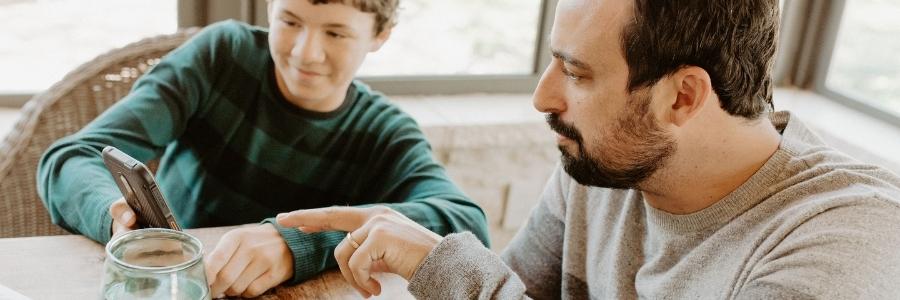Screen Time Shouldn't Make You Anxious

Research finds parenting with tech causes anxiety, but Pinwheel offers the solution.
Do you feel like screen time makes parenting harder? If so, you’re not alone. A Pew Research study launched in 2020 found that the majority of parents think that parenting is harder today than it was two decades ago. And many parents say that technology is to blame.
The concept of Pinwheel materialized from similar frustrations. Once the company launched their unique smartphone operating system, the difficulties that many parents face in this screen time era became greatly minimized.
“Two-thirds of parents in the U.S. say parenting is harder today than it was 20 years ago, with many citing technologies – like social media or smartphones – as a reason.” -Pew Research Center
Most of the parents surveyed weren’t sure where to draw the line on the amount of screen time that children consume on a regular basis, and they said that they were concerned about the negative effects of their child spending too much time in front of screens.
Of course, it’s no coincidence that worries over extended screen time come at a time when tech is readily available to children across the country. Over 60 percent of parents said their young children, aged 5 to 11, interact with a smartphone. About half the group of surveyed parents said their children under the age of 5 use a smartphone. These numbers document the fact that children use screens whether they own a device or not. Children are growing up in an era where screens are a part of their development.
Pinwheel gives parents peace of mind by allowing them to not only control their child’s screen time limits, but by also providing children with quality content, focused on wellness. In the Pinwheel Caregiver Portal, parents can set the device so that a range of functionality is available. For example, parents can access the Caregiver Portal via the app to select no functionality during bedtime hours. Or during school hours, parents can customize which limited functions their child can access, like school-appropriate apps and emergency contacts.
Struggling with YouTube and social media
Surveying that same group of parents, the study shows the majority of the kids---up to 80 percent---watch content on YouTube. Yet, the majority of parents feel concerned about what their kids might stumble across on the platform, with almost half saying that their child has already seen videos that are inappropriate for their age.
Fortunately, Pinwheel understands the problem of not only giving children access to inappropriate content, but also the addictive nature of suggesting one video after the next. YouTube is not available on Pinwheel phones so that parents can feel more at ease with what their kids are consuming.
Besides YouTube, the study found that the other major contender for parental anxiety was social media. And even though most social media sites require a minimum age of 13, almost half of parents said their child under the age of 12 uses TikTok.
The Pinwheel Caregiver Portal allows parents to choose exactly which apps are suitable for their children. Plus, the list of apps which parents can choose from are already vetted to focus on wellness, opposed to entertainment.
Fostering better habits in the younger generation
Last, the study found that most parents feel distracted by their own devices and spend too much time on their own smartphones. Whether children own or borrow a device, youngsters start creating tech habits that will impact their future.
“More than one-third of parents with a child under 12 say their child began interacting with a smartphone before the age of 5.” -Pew Research Center
One of Pinwheel’s goals is to provide young children with healthy tech habits, so throughout their future, they won’t struggle with the temptation to overuse or be distracted by their smartphones.
By providing an elementary school kid with a Pinwheel phone, that child will have no option but to treat their device as a tool, not a toy. Through this, Pinwheel hopes to give the youngest generation a chance to live fully in the world that surrounds them, whether screens are present or not.
-1.png)

.jpg)